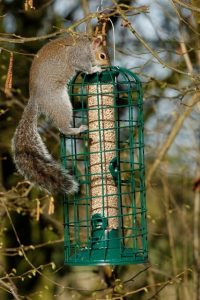Deterring Squirrels

It is, of course, grey squirrels we are talking about here – if you’re lucky enough to have red squirrels coming to your garden then the last thing you’d want to do is deter them. The grey squirrel, however, is not a native species to the UK, and despite its huge population, wide distribution across our shores and arguably attractive looks, it is not welcome in most gardens. Some people do feed and therefore encourage them, but this is not something we recommend: grey squirrels will kill and eat young birds in their nests, cause a huge amount of damage to trees and other vegetation, and they can also find their way into lofts.
In truth though, deterring squirrels from gardens is a problem which few people manage to fully overcome. Not only can squirrels jump great distances, but they also have the uncanny ability to figure out how to overcome almost any obstacle put in their way. That said, keeping them off the actual bird food – provided it is in a feeder – is possible and can be achieved using our range of squirrel resistant feeders.
The main measures you can take to minimise the impact of squirrels on and around your bird feeding area are as follows:
Create a gap between bird feeders and places squirrels can jump from
Ensure there is at least an eight foot gap from vegetation and trees to feeders – this distance is more than squirrels can jump. This will of course mean not hanging feeders from branches, but instead from a feeding station.
Deter squirrels climbing up feeding stations and feeder poles
There are two main ways you can achieve this (though the determined squirrel may still get around both):
Use a Giant Seed Tray & Squirrel Guard
Use a grease on the pole such as Vaseline


